Backbone Dihedral angles Phi (C-N-CA-C) and Psi (N-CA-C-N) define the overall 3D-structure of a protein. Methods are available for the prediction of real value of  and and  dihedral angles. Here we applied average angle assignment technique which can be further integrated with real value prediction methods to obtain better dihedral angles. Here we applied average angle assignment technique which can be further integrated with real value prediction methods to obtain better  and and  angles angles
|
| Using result file obtained from SPINEX server: |
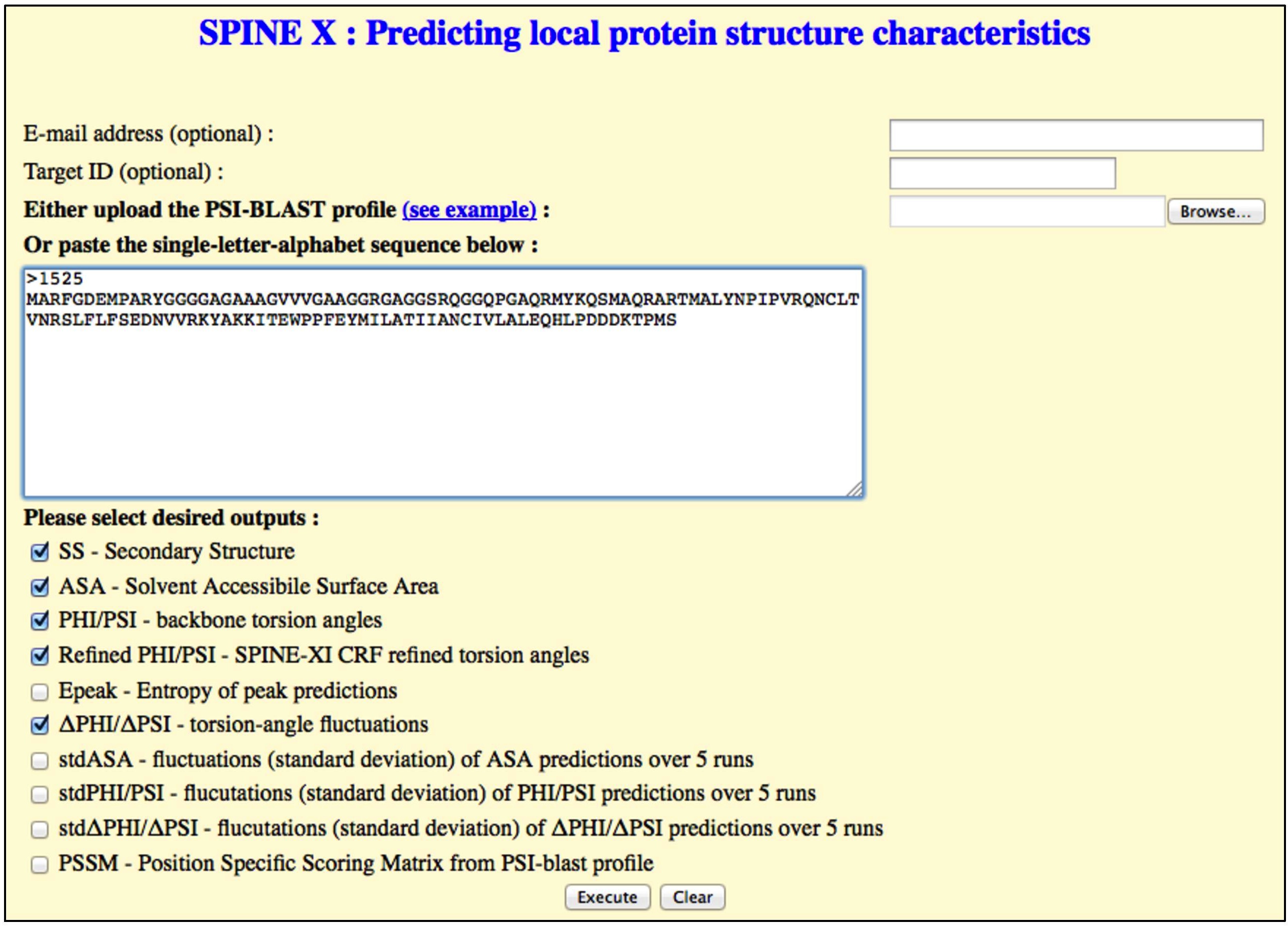
Go to the SPINEX webserver (
http://sparks.informatics.iupui.edu/SPINE-X/)
By default following checkbox are checked:
SS - Secondary Structure
ASA - Solvent Accessibile Surface Area
PHI/PSI - backbone torsion angles
ΔPHI/ΔPSI - torsion-angle fluctuations
You need to check one more checkbox which is:
Refined PHI/PSI - SPINE-XI CRF refined torsion angles as shown in the above diagram encircled with red.
Finally Click on
Execute to run SPINEX which will give results as shown below
Click on the link
"If you need predictions in plain text format, click here to download" to save the results in text file as shown below
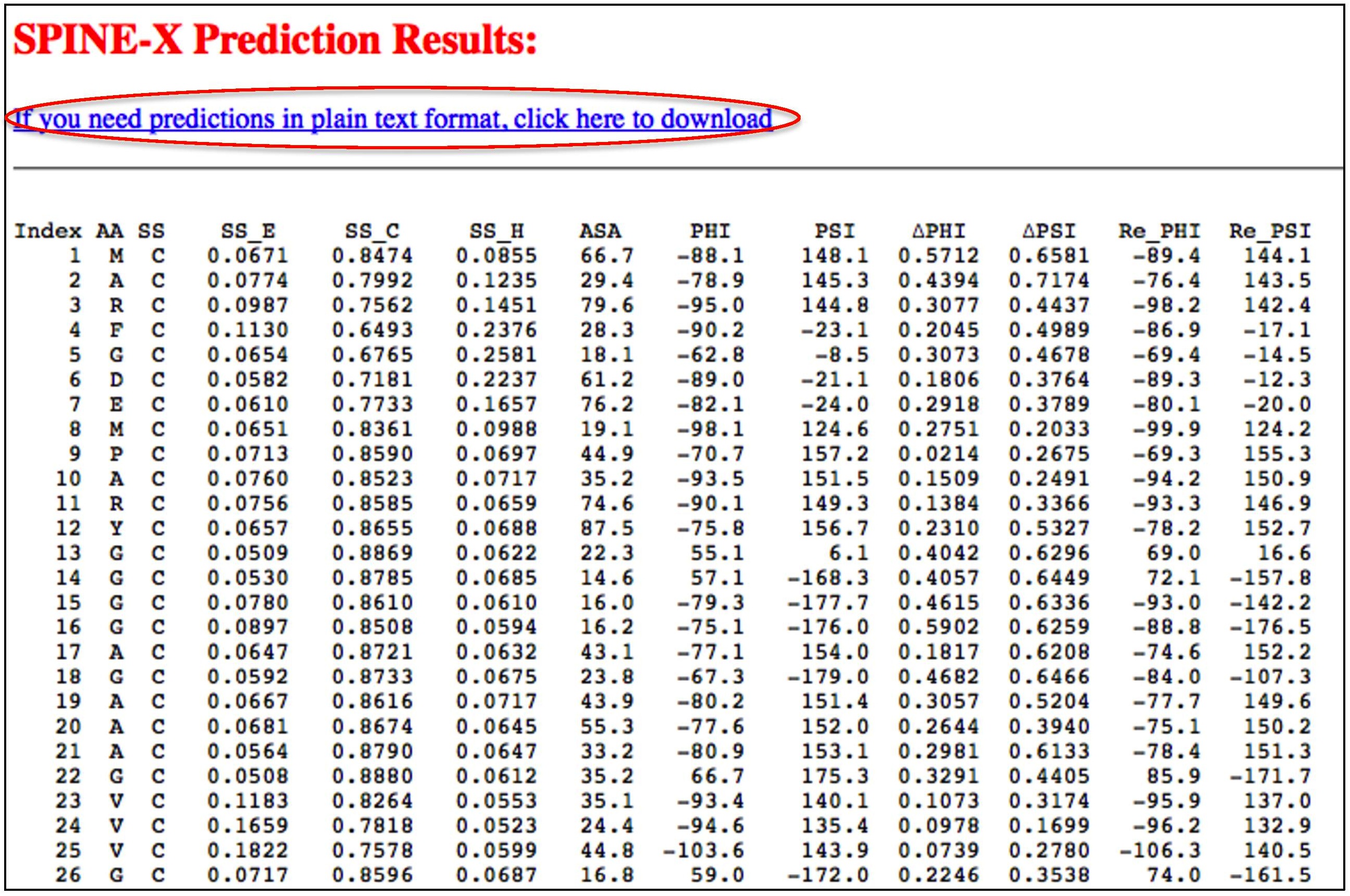
After saving the result in text file, upload that result file to
FiSipred server
User can either paste protein sequence in fasta format in the text box provided or upload file in fasta format
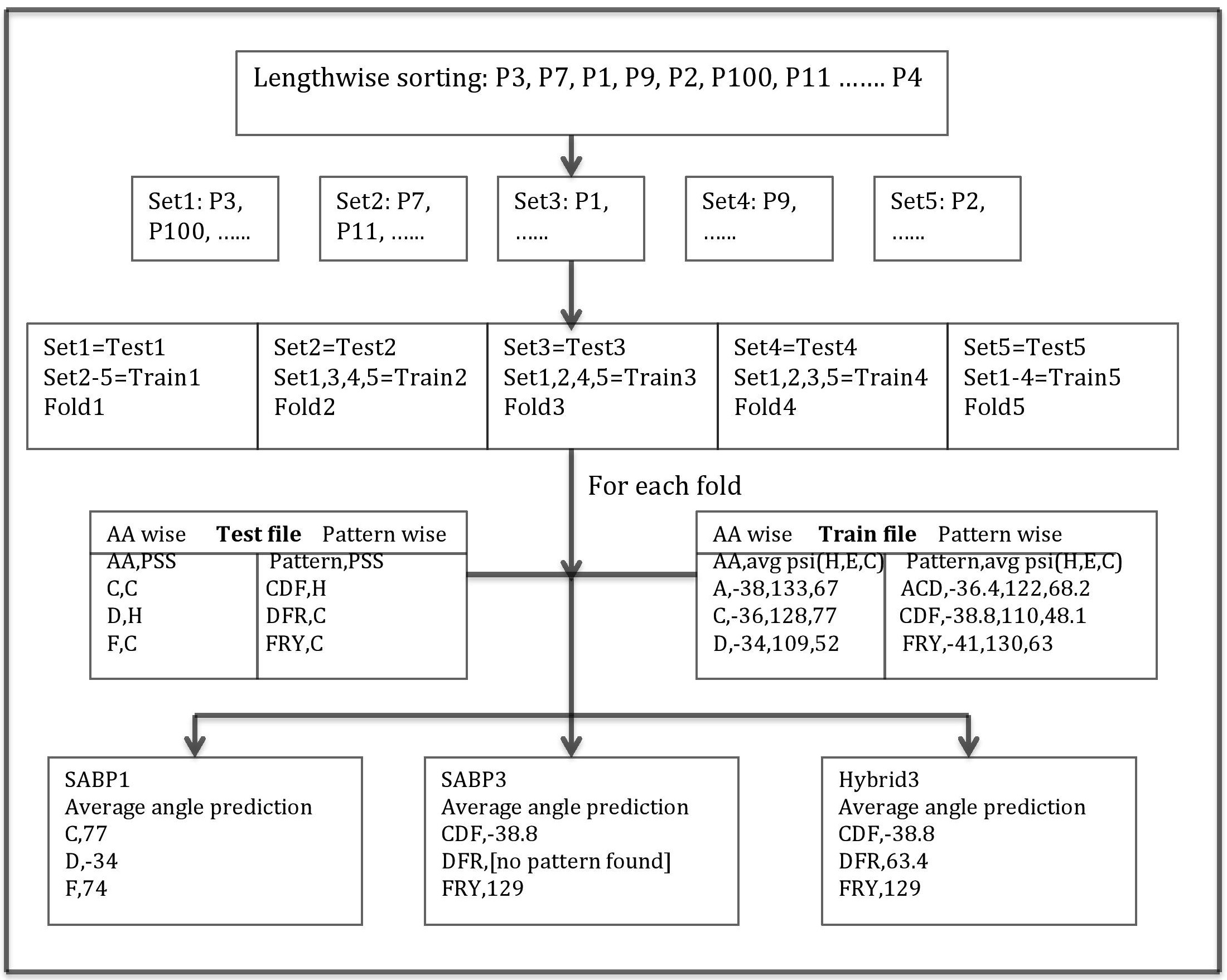
Figure 1: Flow diagram of  and and  angle prediction technique with fivefold cross validation angle prediction technique with fivefold cross validation
|
As explained in the Figure 1, in SABP1 technique, average values of each amino acid in each secondary structure state is precalculated from train file and the same

and

are assigned to the input test file. For example if input file sequence is CDF... and its predicted secondary structure is Coil-Helix-Coil--- then as per train file (Figure 1) psi values will be assigned as 77 for C, -34 for D and 74 for F. Same methodology applies to SABP3 technique.
Similarly in Hybrid3 technique, for input sequence CDFRY, the patterns for window length 3 will be CDF, DFR and FRY. If predicted secondary structure of middle residue of the patterns is Helix (for CDF pattern), Coil (for DFR) and Coil (for FRY) then as per hybrid3 technique, if average

/

value is available from train file then that

/

value will be assigned e.g. for CDF and FRY patterns the assigned psi values are obtained from train file which are -38.8 and 129 respectively. But for DFR pattern, psi value is not available in train file so for this pattern, the value can be predicted from available methods like SPINEX and assigned to the pattern.
As the methods for predicting real value of

/

are available as open source, user can integrate our average assignment method with available prediction method as described in hybrid technique.
Here we provide service to calculate average

/

for input sequence integrating analysis from patterns of window size 7 (SABP7), 5 (SABP5), 3 (SABP3) and 1 (SABP1) which is named as SABP7531. Firstly patterns of window size 7 are made from the input sequence and

/

of middle residue of pattern are assigned. If Phi/Psi are not available for a particular pattern then for that residue pattern of window size 5 is made and

/

are assigned. If

/

is not available from pattern of window size 5 then window size 3 is analysed. If

/

are not available from window size 3 then they are assigned by SABP1.
Results of SABP7531
For input sequence in fasta file format, results are displayed as in Figure 2
>1525
MARFGDEMPARYGGGGAGAAAGVVVGAAGGRGAGGSRQGGQPGAQRMYKQSMAQRARTMALYNPIPVRQNCLTVNRSLFLFSEDN
VVRKYAKKITEWPPFEYMILATIIANCIVLALEQHLPDDDKTPMS
Results of HYBRID (SABP7 + SPINEX)
For input file (result file obtained from SPINEX server), results are displayed as in Figure 3
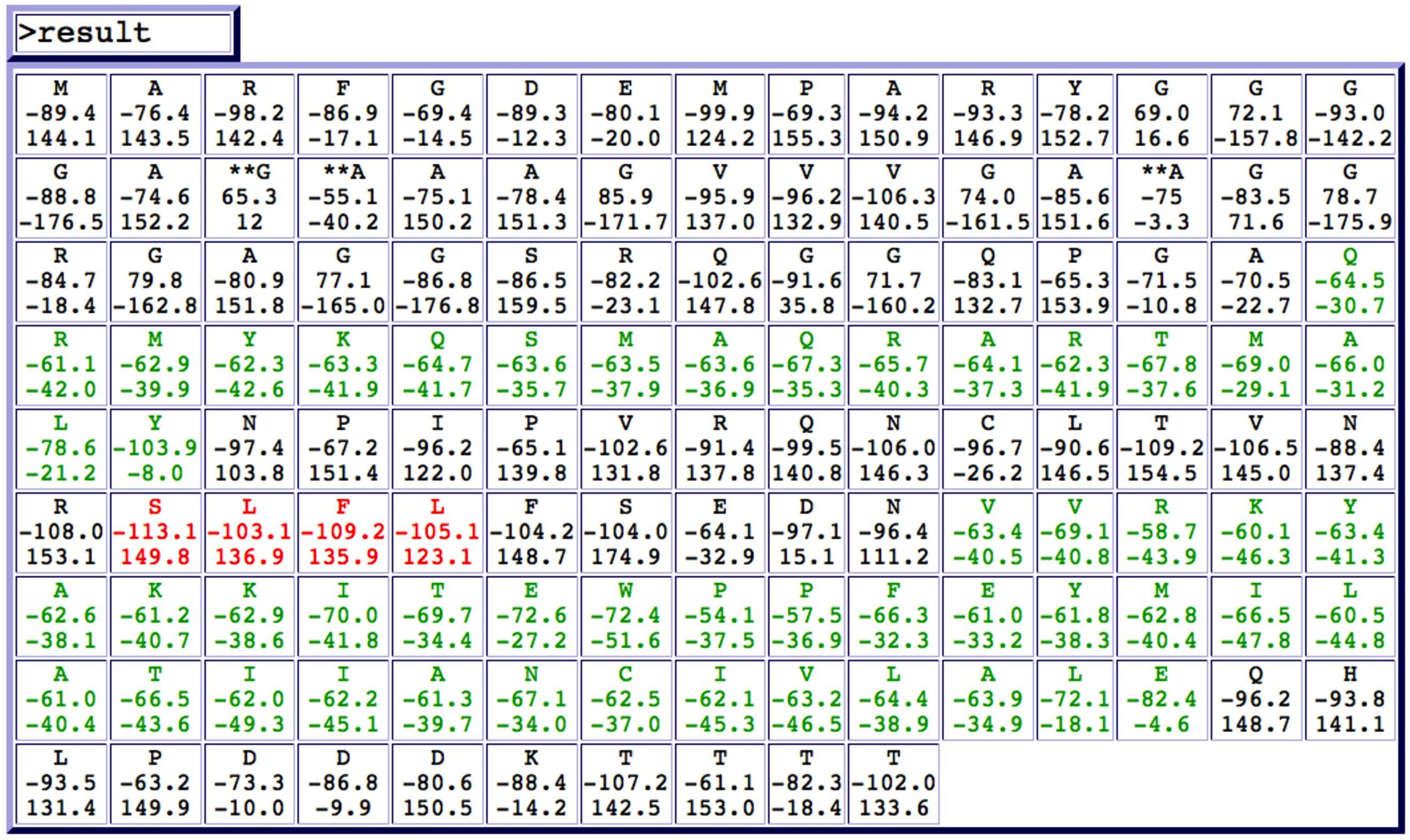
Figure 3: Graphical representation of results. Each residue of input sequence is displayed in a box with its  and
and  values. Double star (**) before a residue means its
values. Double star (**) before a residue means its  /
/ is obtained from SABP7. Absence of double star means the value of
is obtained from SABP7. Absence of double star means the value of  ,
,  is obtained from SPINEX result file uploaded by user. Green, Red and Black color code denotes predicted Helix, Sheet and Coil regions respectively. (e.g. 1st residue is M (Met) with
is obtained from SPINEX result file uploaded by user. Green, Red and Black color code denotes predicted Helix, Sheet and Coil regions respectively. (e.g. 1st residue is M (Met) with  =-89.4 and
=-89.4 and  =144.1 degrees obtained from SPINEX and its SPINEX predicted secondary structure is Coil.
=144.1 degrees obtained from SPINEX and its SPINEX predicted secondary structure is Coil.
Results can also be downloaded as a text file which is in the format given below
Results of SABP7531
#AA --> Amino acid 1 letter code
#PSS --> Predicted Secondary Structure
#phi1 --> phi value obtained from SABP1 and psi1 --> psi value obtained from SABP1
#phi3 --> phi value obtained from SABP3 and psi3 --> psi value obtained from SABP3
#phi5 --> phi value obtained from SABP5 and psi5 --> psi value obtained from SABP5
#phi7 --> phi value obtained from SABP7 and psi7 --> psi value obtained from SABP7
AA PSS phi_1 psi_1 phi_3 psi_3 phi_5 psi_5 phi_7 psi_7
>1525
M C -38.06 81.46 360 60.39 360 -17.6 NA NA
A C -68.07 75.15 -79.18 87.97 NA NA NA NA
R C -77.41 71.22 -82.28 41.31 NA NA NA NA
F C -87.85 83.19 -84.70 61.72 NA NA NA NA
G C 36.33 5.52 12.27 -38.39 -93.1 134.7 NA NA
D C -74.24 52.11 -81.77 57.87 NA NA NA NA
E C -71.84 66.02 -71.16 21.17 NA NA NA NA
. . .... .... .... .... .... .... .... ....
. . .... .... .... .... .... .... .... ....
. . .... .... .... .... .... .... .... ....
. . .... .... .... .... .... .... .... ....
P C -62.69 94.30 -65.31 97.82 -60.1 146.92 NA NA
D C -74.24 52.11 -70.38 22.58 NA NA NA NA
D C -74.24 52.11 -73.37 27.43 -98.8 14.65 NA NA
D C -74.24 52.11 -60.92 33.74 -89.62 4.98 NA NA
K C -71.48 66.29 -61.11 26.62 -105.9 0.9 NA NA
T C -91.96 73.63 -99.95 134.76 NA NA NA NA
P C -62.69 94.30 -65.24 105.80 NA NA NA NA
M C -38.06 81.46 -77.32 73.92 NA NA NA NA
S C -77.17 76.09 -53.7 360 -159.7 360 NA NA
Figure 4: Results for each sequence in input file starts with sequence id as given in its fasta format followed by  /
/ values for each residue
values for each residue
In the example above, sequence id is 1525 followed by result of each amino acid. 1st residue is M (Met) with predicted secondary structure of coil,  and
and  obtained from SABP1 are -38.06 and 81.46 respectively,
obtained from SABP1 are -38.06 and 81.46 respectively,  and
and  obtained from SABP3 are 360 and 60.39 respectively, NA in last 2 columns represents that
obtained from SABP3 are 360 and 60.39 respectively, NA in last 2 columns represents that  and
and  values were not available from SABP7.
values were not available from SABP7.
Results of HYBRID (SABP7 + SPINEX)
#AA --> Amino acid
#PSS --> Predicted Secondary Structure (SPINEX)
#phi --> phi dihedral angle obtained from HYBRID
#psi --> psi dihedral angle obtained from HYBRID
AA PSS phi psi
>result
M C -89.4 144.1
A C -76.4 143.5
R C -98.2 142.4
F C -86.9 -17.1
G C -69.4 -14.5
D C -89.3 -12.3
E C -80.1 -20.0
. . .... ....
. . .... ....
. . .... ....
. . .... ....
P C -63.2 149.9
D C -73.3 -10.0
D C -86.8 -9.9
D C -80.6 150.5
K C -88.4 -14.2
T C -107.2 142.5
P C -61.1 153.0
M C -82.3 -18.4
S C -102.0 133.6



 and
and  dihedral angles. Here we applied average angle assignment technique which can be further integrated with real value prediction methods to obtain better
dihedral angles. Here we applied average angle assignment technique which can be further integrated with real value prediction methods to obtain better  and
and  angles
angles



 and
and  angle prediction technique with fivefold cross validation
angle prediction technique with fivefold cross validation
 and
and  are assigned to the input test file. For example if input file sequence is CDF... and its predicted secondary structure is Coil-Helix-Coil--- then as per train file (Figure 1) psi values will be assigned as 77 for C, -34 for D and 74 for F. Same methodology applies to SABP3 technique.
are assigned to the input test file. For example if input file sequence is CDF... and its predicted secondary structure is Coil-Helix-Coil--- then as per train file (Figure 1) psi values will be assigned as 77 for C, -34 for D and 74 for F. Same methodology applies to SABP3 technique.
 /
/ value is available from train file then that
value is available from train file then that  /
/ value will be assigned e.g. for CDF and FRY patterns the assigned psi values are obtained from train file which are -38.8 and 129 respectively. But for DFR pattern, psi value is not available in train file so for this pattern, the value can be predicted from available methods like SPINEX and assigned to the pattern.
value will be assigned e.g. for CDF and FRY patterns the assigned psi values are obtained from train file which are -38.8 and 129 respectively. But for DFR pattern, psi value is not available in train file so for this pattern, the value can be predicted from available methods like SPINEX and assigned to the pattern.
 /
/ are available as open source, user can integrate our average assignment method with available prediction method as described in hybrid technique.
are available as open source, user can integrate our average assignment method with available prediction method as described in hybrid technique.
 /
/ for input sequence integrating analysis from patterns of window size 7 (SABP7), 5 (SABP5), 3 (SABP3) and 1 (SABP1) which is named as SABP7531. Firstly patterns of window size 7 are made from the input sequence and
for input sequence integrating analysis from patterns of window size 7 (SABP7), 5 (SABP5), 3 (SABP3) and 1 (SABP1) which is named as SABP7531. Firstly patterns of window size 7 are made from the input sequence and  /
/ of middle residue of pattern are assigned. If Phi/Psi are not available for a particular pattern then for that residue pattern of window size 5 is made and
of middle residue of pattern are assigned. If Phi/Psi are not available for a particular pattern then for that residue pattern of window size 5 is made and  /
/ are assigned. If
are assigned. If  /
/ is not available from pattern of window size 5 then window size 3 is analysed. If
is not available from pattern of window size 5 then window size 3 is analysed. If  /
/ are not available from window size 3 then they are assigned by SABP1.
are not available from window size 3 then they are assigned by SABP1.
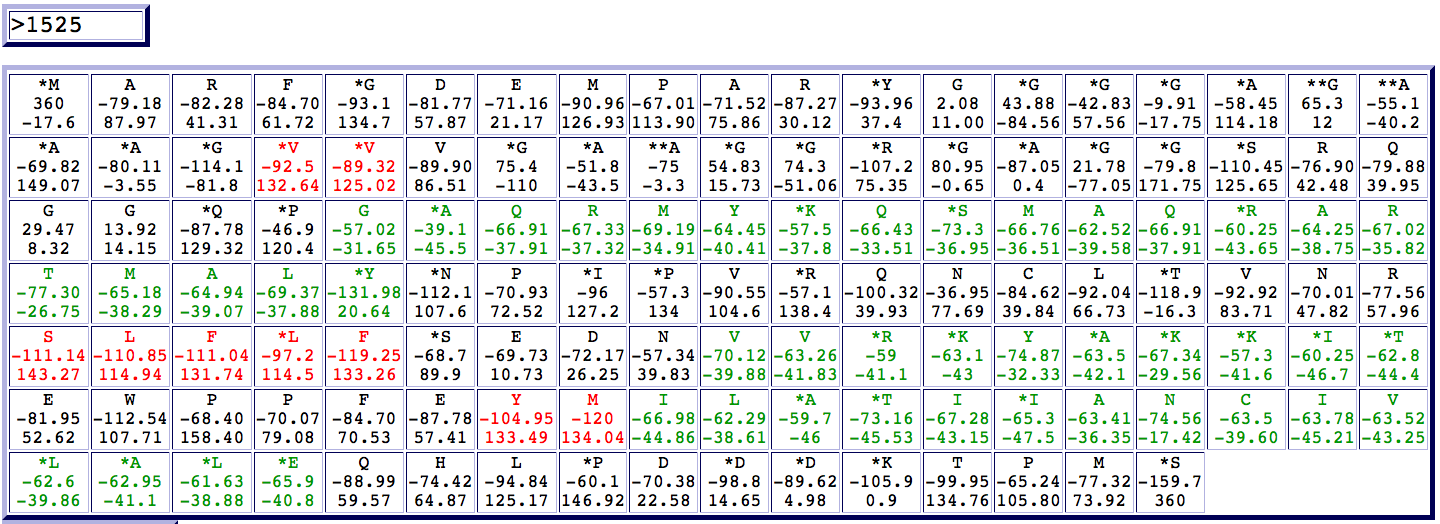

 and
and  values. Double star (**) before a residue means its
values. Double star (**) before a residue means its  /
/ is obtained from SABP7. Absence of double star means the value of
is obtained from SABP7. Absence of double star means the value of  ,
,  is obtained from SPINEX result file uploaded by user. Green, Red and Black color code denotes predicted Helix, Sheet and Coil regions respectively. (e.g. 1st residue is M (Met) with
is obtained from SPINEX result file uploaded by user. Green, Red and Black color code denotes predicted Helix, Sheet and Coil regions respectively. (e.g. 1st residue is M (Met) with  =-89.4 and
=-89.4 and  =144.1 degrees obtained from SPINEX and its SPINEX predicted secondary structure is Coil.
=144.1 degrees obtained from SPINEX and its SPINEX predicted secondary structure is Coil. /
/ values for each residue
values for each residue
 and
and  obtained from SABP1 are -38.06 and 81.46 respectively,
obtained from SABP1 are -38.06 and 81.46 respectively,  and
and  obtained from SABP3 are 360 and 60.39 respectively, NA in last 2 columns represents that
obtained from SABP3 are 360 and 60.39 respectively, NA in last 2 columns represents that  and
and  values were not available from SABP7.
values were not available from SABP7.